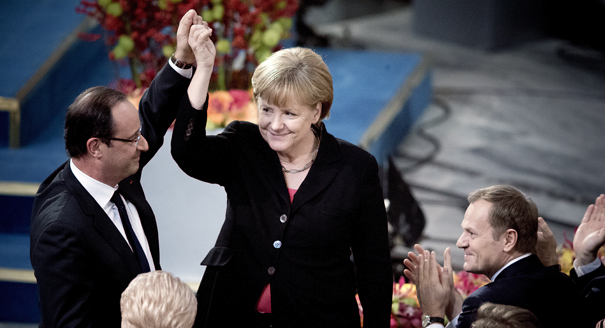Judy Dempsey
{
"authors": [
"Judy Dempsey"
],
"type": "commentary",
"blog": "Strategic Europe",
"centerAffiliationAll": "",
"centers": [
"Carnegie Endowment for International Peace",
"Carnegie Europe"
],
"collections": [],
"englishNewsletterAll": "",
"nonEnglishNewsletterAll": "",
"primaryCenter": "Carnegie Europe",
"programAffiliation": "",
"programs": [],
"projects": [],
"regions": [
"Europe"
],
"topics": [
"EU"
]
}
Source: Getty
The Franco-German Engine Needs to Restart
Fifty years after the signing of the Élysée Treaty, France and Germany need to find the political will to set up a European foreign and security policy deserving of its name.
This coming Tuesday, Angela Merkel and François Hollande will celebrate the fiftieth anniversary of the signing of the Élysée Treaty. It was a historic diplomatic feat. It led to a remarkable reconciliation between two countries that for centuries had fought against each other, leaving behind a trail of terrible destruction, enmity, and distrust.
Yet even after fifty years of working closely together, France and Germany hold fundamentally different views about security, defense, and the European Union itself.
This was made abundantly clear by Hollande’s decision this month to send fighter jets and soldiers to Mali in order to try and oust the radical Islamists from the north of the country. Germany provided a bare minimum of support, confirming that the reconciliation between France and Germany has not created a common attitude about the fundamental problems facing Europe.
France has consistently argued that Europe should have a strong common security and defense policy. Critics have often argued that France, with its strong Gaullist tradition, pursues this goal in order to weaken Europe’s links with NATO and the United States.
There was some truth to that several years ago. But not anymore. France understands that without America’s huge contribution to NATO, the majority of European countries would be militarily toothless. Germany, in particular, is simply not prepared to contribute serious military assets and capabilities to Europe’s fledgling security and defense policy.
France, as a major military—and nuclear power—in Europe, has few qualms about sending troops into combat zones. The French public tolerates casualties. The existence of the French Legion, that is made up of mercenary soldiers, plays some role in explaining the public’s attitude.
Germany, in contrast, is deeply skeptical of any kind of combat operation. More than sixty years after the end of World War II, the German public’s reflexes are shaped by a mixture of indifference and pacifism. And Merkel, despite her conservative political background, has proven particularly unwilling to confront voters over security and defense issues, to the point of reneging on Germany’s responsibility towards creating a viable European security and defense policy. Don’t forget that it was her predecessor, Gerhard Schröder, a social democrat, who agreed to send German soldiers into Kosovo and Afghanistan.
These days, Berlin seems completely uninterested in the debate about Europe’s security and defense goals. It has done almost nothing to support the pooling and sharing of military assets in a time of fiscal austerity across Europe.
The Libyan operation of 2011 illustrates how fundamental the differences between France and Germany are on security policy. France, supported by Britain, led the military campaign against the Gaddafi regime. It was an attempt by former French president, Nicolas Sarkozy to demonstrate that Europe could act. Yet Germany refused to participate and even abstained over a United Nations Security Council resolution to impose a no-fly zone over Libya.
Without Germany playing a greater security role in Europe, chances are high that Europe will continue to depend on NATO for its security and defense needs. France, meanwhile, will have to create its own coalitions of the willing to fight for its—and Europe’s—interests.
Paris and Berlin are at odds, too, over Europe’s future. This is not new. For many years, France supported a Europe driven by national governments, as that seemed to provide the best chance for France to exert major influence.
Germany, under the conservative Chancellor Helmut Kohl, had long worked for more political and economic integration that would strengthen the European Commission at the expense of national governments.
Wolfgang Schäuble, Germany’s finance minister, continues in that tradition. But Merkel is vacillating between her recognition of the need of more integration and a desire to protect the powers of the member states. Without any clear lead from Berlin, European integration will remain stalled.
Over the years, the European “machine” progressed because France and Germany agreed to be the engine drivers. Just think of the creation of the internal market, the production of Airbus, the launch of the euro. None of these could have taken place without the special cooperation between France and Germany. It is a mistake to believe that because the EU is bigger, the Berlin-Paris tandem is less important.
The next step in European integration must necessarily encompass foreign and security policy, even if they still represent the essence of sovereignty. This is the area where Europe would gain most from joining forces; the case of Mali is a timely reminder of the urgency of common action. And as wide as the gap is between France and Germany on foreign and defense policy, it is no wider than the differences between both countries have been in the past over economic policy, social legislation, or the role of central banks.
European integration has worked because political will in Paris and Berlin was strong enough to supersede these differences. Today, fifty years after the signing of the Élysée Treaty, Europe has become ever more complex. The euro crisis has exposed the economic and structural weakness of the EU. The highly unpredictable global and security context in which Europe has to function means that more than ever, France and Germany must find the will to work together. If they don’t, Europe will remain a pygmy.
About the Author

Nonresident Senior Fellow, Carnegie Europe
Dempsey is a nonresident senior fellow at Carnegie Europe
- Europe Needs to Hear What America is SayingCommentary
- Babiš’s Victory in Czechia Is Not a Turning Point for European PopulistsCommentary
Judy Dempsey
Recent Work
More Work from Strategic Europe
- Europe on Iran: Gone with the WindCommentary
Europe’s reaction to the war in Iran has been disunited and meek, a far cry from its previously leading role in diplomacy with Tehran. To avoid being condemned to the sidelines while escalation continues, Brussels needs to stand up for international law.
Pierre Vimont
- Taking the Pulse: Can European Defense Survive the Death of FCAS?Commentary
France and Germany’s failure to agree on the Future Combat Air System (FCAS) raises questions about European defense. Amid industrial rivalries and competing strategic cultures, what does the future of European military industrial projects look like?
Rym Momtaz, ed.
- Macron Makes France a Great Middle PowerCommentary
France has stopped clinging to notions of being a great power and is embracing the middle power moment. But Emmanuel Macron has his work cut out if he is to secure his country’s global standing before his term in office ends.
Rym Momtaz
- How Europe Can Survive the AI Labor TransitionCommentary
Integrating AI into the workplace will increase job insecurity, fundamentally reshaping labor markets. To anticipate and manage this transition, the EU must build public trust, provide training infrastructures, and establish social protections.
Amanda Coakley
- Can Europe Still Matter in Syria?Commentary
Europe’s interests in Syria extend beyond migration management, yet the EU trails behind other players in the country’s post-Assad reconstruction. To boost its influence in Damascus, the union must upgrade its commitment to ensuring regional stability.
Bianka Speidl, Hanga Horváth-Sántha










